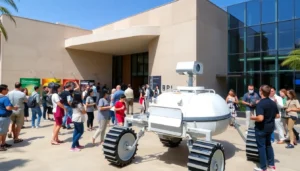Table of Contents
ToggleSpace exploration might sound like a sci-fi movie plot, but it’s more than just astronauts floating around in shiny suits. It’s a thrilling adventure that brings tangible benefits right back to Earth. From developing cutting-edge technologies to inspiring the next generation of innovators, the impact of exploring the cosmos is nothing short of stellar.
Imagine a world where GPS works flawlessly, weather forecasts are spot-on, and medical imaging technology saves lives—all thanks to the wonders of space research. These aren’t just perks for sci-fi enthusiasts; they’re everyday realities that improve our lives in countless ways. So buckle up as we dive into how the quest for the stars enriches our society and fuels progress right here on our home planet.
Understanding Space Exploration
Space exploration involves sending humans and robotic systems beyond Earth’s atmosphere to gather information and conduct experiments. Scientific research conducted in space leads to significant breakthroughs. These breakthroughs often translate to practical applications that enhance daily life.
Technologies developed for space missions directly impact various sectors. GPS systems provide accurate navigation. Weather satellites deliver precise forecasting, improving disaster preparedness. Medical technologies, like MRI and CT scans, stem from innovations initially designed for space research.
The pursuit of knowledge in the cosmos drives innovation and encourages collaboration across multiple disciplines. Engineers, scientists, and policymakers work together to address complex challenges. This teamwork fosters new ideas, resulting in advanced materials and communications technologies.
Space exploration also inspires future generations. Children fascinated by the stars often pursue careers in STEM fields. Their enthusiasm contributes to the workforce, driving technological advancements and economic growth.
Moreover, global collaborations in space efforts promote peace and mutual understanding among nations. Countries unite to share resources, knowledge, and expertise in a common quest for discovery. This cooperation builds international relationships and strengthens diplomacy.
Never underestimate the long-term effects of space exploration on Earth. Innovations in sustainability often emerge from research conducted in space. Understanding the universe can lead to advancements in environmental monitoring and resource management, benefiting society as a whole.
Ultimately, space exploration lays the groundwork for future discoveries. The quest for knowledge not only unlocks secrets of the universe but improves life on Earth in countless ways. Prioritizing investment in space initiatives ensures ongoing benefits for humanity and progress.
Technological Advancements

Technological advancements from space exploration greatly influence society. These developments improve everyday life and drive further innovations.
Innovations from Space Research
Innovations from space research lead to breakthroughs that redefine technology. Satellite technology emerged to enhance telecommunications and global positioning systems. Engineers designed advanced materials to withstand extreme conditions in space, resulting in stronger, lighter materials for everyday products. Moreover, robotics evolving from space missions now supports various industries, including healthcare and manufacturing. New software and data processing techniques developed for space missions also enhance analytical capabilities across fields like finance and education. Each of these innovations showcases how space research transforms and elevates technology for all.
Everyday Applications of Space Technology
Everyday applications of space technology illustrate its profound impact. GPS, rooted in satellite technology, aids navigation for millions globally. High-resolution satellite imagery supports agricultural monitoring and urban planning. Weather forecasting relies on data from space-based systems, ensuring timely warnings for severe weather events. Medical imaging, enhanced by technologies initially developed for space, assists in diagnosing conditions accurately. Additionally, telecommunication systems depend on satellites, connecting individuals across vast distances. Each application not only showcases space achievements but also emphasizes their necessity in modern society.
Economic Benefits
Space exploration drives significant economic advantages, fostering job growth and generating investment opportunities. This dynamic sector plays a crucial role in enhancing the overall economy.
Job Creation in the Space Sector
Job creation in the space sector expands rapidly. Each new project and initiative attracts skilled workers, creating thousands of positions in engineering, technology, and research. Companies such as SpaceX and Blue Origin contribute to this trend, needing engineers, scientists, and support staff. This influx of jobs not only supports local economies but also stimulates innovation. Training programs develop the workforce, preparing individuals for careers that advance various scientific fields. Overall, the space industry has the potential to revitalize communities and encourage future generations to engage in STEM careers.
Investment and Growth Opportunities
Investment in space exploration leads to substantial growth opportunities. Public and private sectors increasingly prioritize funding for technologies that propel space missions and related industries. Each dollar invested results in substantial returns through advanced technologies and applications. For instance, NASA’s budget supports various startups and research projects, encouraging collaboration that fosters innovation. Emerging markets in satellite services and space tourism further attract investors seeking new avenues for growth. These investments not only enhance economic stability but also stimulate job creation, ultimately benefiting society as a whole.
Scientific Knowledge
Space exploration significantly enhances scientific knowledge, offering insights that shape our understanding of the universe. Throughout missions and research, scientists uncover vital information crucial for addressing global challenges.
Understanding Our Universe
Studying celestial bodies expands knowledge about the cosmos. Astronomers analyze data from telescopes and spacecraft to learn about the formation of stars, galaxies, and planets. For instance, the Hubble Space Telescope has provided images revealing the universe’s vastness and complexity. Exploration of Mars aids in uncovering clues about potential life beyond Earth. Observations from missions like Mars Rover contribute to theories about climate and geological processes relevant to both Earth and its neighbors.
Advancements in Earth Sciences
Earth sciences benefit from technologies developed for space missions. Satellites equipped with sensors monitor weather patterns and natural disasters, improving predictive capabilities. These innovations enable quicker response times during crises, mitigating risks to communities. Research from orbit also informs climate change initiatives, offering data to track atmospheric conditions over time. The results of this research affect policies and strategies for environmental conservation, ensuring that society remains proactive in preserving the planet’s health.
Environmental Monitoring
Space exploration plays a crucial role in monitoring Earth’s environment. Satellites equipped with advanced sensors collect data that helps scientists understand climate dynamics.
Climate Change Research
Satellite imagery provides valuable insights into climate change. Observing atmospheric changes enables researchers to track greenhouse gas emissions. This information aids in developing effective climate policies. Years of data from space contribute to a comprehensive understanding of temperature fluctuations. These insights drive innovations in renewable energy and sustainable practices, supporting global efforts to mitigate climate impacts.
Disaster Management
Space technology enhances disaster management capabilities. Satellites monitor natural disasters like hurricanes, floods, and wildfires in real time. This data allows emergency responders to act swiftly and efficiently. High-resolution images guide evacuations and resource distribution during crises. Additionally, information from space helps predict extreme weather events, saving lives and minimizing economic losses. These advancements underscore the importance of integrating space exploration with disaster response strategies.
Space exploration serves as a catalyst for societal advancement. The innovations birthed from this pursuit permeate daily life enhancing technology healthcare and environmental monitoring. As the space sector continues to grow it fuels job creation and economic opportunities while inspiring future generations to engage in STEM fields.
Investing in space initiatives not only drives scientific discovery but also equips society with the tools needed to tackle pressing global challenges. The benefits extend beyond the cosmos fostering a more informed and resilient world. Embracing space exploration is essential for ensuring a brighter future for humanity.







